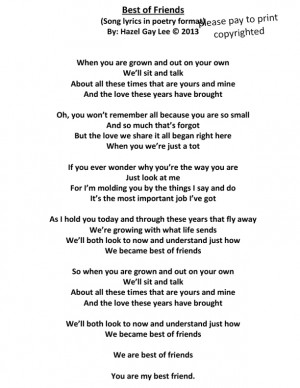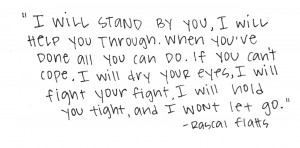

It's important to remember that how 'catchy' your song is in not just a product of the music and melody it also comes from the lyrics, especially the rhythm and rhyming scheme. Consider the rhyming scheme, if there is one You also run the risk of alienating listeners that don't know what a word means.Ģ3. These words often look fine on paper, but normally don't translate well into song. Be cautious when using 'clever' or overly elaborate language Take the sound as well the meaning of the word into account when writing.Ģ2. Some words sound spikey, some stodgy, some open, some blunt, some roll off the tongue. Words have an inherent sound to them which becomes even more pronounced when sung rather than spoken.
#BEST LYRICAL SONGS FULL#
Avoid using too many different pronouns in the same song though as this may be confusing.Ĭramming a line full of words where they clearly won't fit may cause each word to lose its impact it's normally wiser to re-write the line completely rather than trying to play literary Tetris. Lyrics with plural pronouns such as 'we' and 'they', for example, can give a very different feel to a song. Songs don't always have to be written using 'you' or 'I'.


This isn't to say that you shouldn't be yourself, but a bit of experimentation won't hurt. Creative droughts can often be tackled by radically changing the outlook of your lyrics. Songs can be humble, arrogant, hopeful, sombre, aggressive and more. Don't rely on just one small line to put the whole song in context. Remember that the listeners might miss a word, or a line, or three. It can be interesting to write about the past, present and future, sometimes all within the same song. Complex emotions are often difficult to describe it's sometimes more effective to use imagery (see tip 14) or context (see tip 8) to convey an emotion rather than simply stating it. Used well, it can evoke emotions or moods that can't be created by using blunt description alone.īe careful when using the emotional abstract, for example, saying things like "I want to feel free". While they are clearly essential to a songwriter, adding too many can make a lyric less concise.ĭon't feel that using imagery will make your lyrics too arty or flowery. Context is everything: a joyous chorus after a more solemn verse can make the chorus even more uplifting.ĭon't use an excess of adjectives, or describing words. A line can have its own rhythmic bounce or flair and still fit in within the overall rhyming scheme.Ĭontrasting the happy and positive with the sad and downbeat within a song can be very powerful. A common trick is to write the 'setup' during the verse, and the emotional 'payoff' in the chorus.Įxperiment with rhythm within a line. They often need to be more 'plain' and easy to remember. Choruses are from Venus, verses are from MarsĬhoruses require a different approach to verses, especially if you're writing pop. Another viewpoint can put an interesting spin on an otherwise straightforward point.ġ0. A quick test is to read the finished song through from start to finish, asking yourself "does this make sense?"Īdding a back-story to explain the situation (for example) can add interest, and can change the entire meaning of any lyrics following it.įor example, a classic songwriting trick is to describe an event in the first verse, and add perspective by describing how it affected you or made you feel in the second verse. This is particularly important in narrative songs (songs that tell a story). Make sure the song has a clear structure and progression. Try to pick out the differences in lyrics between your favourite songs and your own, and apply any lyrical techniques you learn to your own work. You should be able to sum up the essence of the song in one sentence. Try to have a clear idea of what the song is about. That way, you won't spend hours wrestling with one small line that might turn out to be insignificant in the wider context of the song.
#BEST LYRICAL SONGS HOW TO#
If you can't quite figure out how to say what you want within a particular line, jot down the gist of it and move on to another part of the song - you can come back to it later. Don't expect a song to arrive fully formed they sometimes take time and you'll need to work at it. More often than not, songs aren't born, they're created and sculpted.


 0 kommentar(er)
0 kommentar(er)
